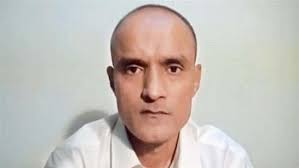By Muhammad Luqman
Pakistan has decided to grant consular access to Indian spy Kulbhushan Jadhav by tomorrow (Friday) , who was convicted and sentenced to death by a military tribunal for spying.
The International Court of Justice’s (ICJ) verdict, in the case, asked Pakistan to immediately inform Jadhav of his rights under Article 36, and grant India consular access, according to the Foreign Office’s (FO) spokesperson.
In this regard, Pakistan is awaiting Indian response and formally informed Indian High Commission.
The ICJ, in its ruling, asked Pakistan to ensure “effective review and reconsideration of his conviction and sentences”.
The ICJ said that even though it had found Pakistan in violation of Article 36 the Vienna Convention on Consular Relations (VCCR), “it is not the conviction and sentence of Mr. Jadhav which are to be regarded as a violation of Article 36 of the Vienna Convention.”
The most the ICJ said it could do was to order Pakistan to cease violation of Article 36 and review the case in light of how that violation may have affected the case’s outcome.
To this end, Pakistan was directed to immediately inform Jadhav of his rights under Article 36, grant India consular access, and then review the case while considering, under the laws of Pakistan, how not doing so earlier may have impacted the case’s outcome.
Article 36 of the Vienna Convention simply states that when a national of a foreign country is arrested, they must be informed of the right to have their country’s consulate notified and should also have the right to regular consultation with their consulate’s officials during their detention and trial.
Pakistan had argued that Article 36 is not applicable to persons believed to be involved in espionage
Speaking in New Delhi, Indian foreign ministry spokesman Raveesh Kumar confirmed that they had received a proposal from Pakistan.
“We have received a proposal from Pakistan. We are evaluating the proposal in the light of [the] ICJ judgement,” Indian newspaper,The Economic Times quoted him as saying.
Kumar said India will “maintain communication with Pakistan in this matter through diplomatic channels”.
The Hague-based ICJ on July 17 had rejected India’s request for acquittal, release and return of Commander Jadhav. However, the world court asked Pakistan to provide consular access to him under the Vienna Convention.
Following the verdict, the FO had announced that as a responsible state Pakistan would grant consular access to Jadhav according to the country’s laws, for which modalities were being worked out.
It said that pursuant to the ICJ judgement, Jadhav had been informed of his rights under Article 36, Paragraph 1(b) of the Vienna Convention on Consular Relations.
In its verdict that followed proceedings lasting about two years, the UN’s top court did not accept India’s contention that Jadhav was entitled to ‘restitutio in integrum’ (restoration to original position) and turned down its request to annul the decision of a military court.
Instead, it ruled that Pakistan by means of its own choosing could undergo an effective review and reconsideration of the sentence awarded to Jadhav.
Jadhav was arrested on March 3, 2016, in a counter-intelligence operation in Balochistan. A military court awarded him death sentence on April 10, 2017, following his confession that he had mounted operations for India’s Research and Analysis Wing to conduct terrorist activities on Pakistani soil.















